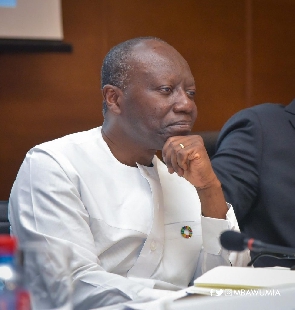The term ‘debt exchange’ has become one of the most frequently used phrases in Ghana's media space in recent times.
This financial phrase is being used by government officials, politicians, and experts in reference to how the government of Ghana is going to handle the huge debt it has accrued over the past few years, which many believe has caused the economic challenges in the country.
The government, through the Ministry of Finance, announced a debt exchange programme, dubbed the Domestic Debt Exchange (DDE) programme.
The announcement led to some commotion in the labour sector, and after threats of strikes, the government amended some details of the DDE.
But ordinary Ghanaians, who may even be affected by this debt Exchange programme, do not have a full grasp of what it is.
This article seeks to shed some light on everything about the debt Exchange programme.
What is a bond?:
Every government in the world, including those of advanced countries like Germany and the United States, borrows domestically (from its citizens) and internationally to run their economies.
It accomplishes this by issuing debt instruments such as bonds through financial intermediaries such as banks and other financial institutions.
The government promises an ordinary Ghanaian profit (interest) if s/he lends it a said amount of money (principal) after an agreed period of time. This agreement is what is referred to as bonds (government bonds).
Debt Exchange:
Now, what the government is seeking to do with its debt exchange programme, the DDE, is to amend the interest it promised the Ghanaian who loaned it money (the bondholder) and the duration for which the lender is supposed to get his interest and principal back.
In other words, the government is swapping the agreement (the time and the promised interest) it had with the bondholder with a new one (new interest (s) and/or new duration(s)), hence the name, debt exchange.
For example, if you held a government bond as of December 1, 2022, which was supposed to mature in 2025, the government is now promising you four new bonds (agreements) which are expected to mature in 2027, 2029, 2032 and 2037. And you are expected to earn 0% interest in 2023, 5% interest in 2024, and 10% in 2025, which will continue till the maturity of your bond (when you are expected to get your investment with the promised interest).
Consequences of debt exchange:
So, why are a lot of bondholders kicking against the government's proposal? Are they going to lose their money?
Well, most of these rejections are based on arguments about the time value of money. That is, even though bondholders will get their investment back, getting it at a future date means the value of the money they receive will reduce due to inflationary pressures.
In other words, you can use the GH¢100,000 you will receive to buy a house in 2023, but you may not be able to buy the same house with GH¢100,000 in 2027.
Also, some bondholders live on the interest they receive from the government, so not getting it will affect their livelihood.
Who will the DDE programme affect?
Initially, the government stated that the programme would affect securities dealers and funds, private banks and investment companies, insurance schemes, pension funds, and non-resident investors.
But after pressure and threats of strikes by labour unions, the government excluded pension funds which could have affected groups such as Mineworkers Union Trades Union Congress Ghana Medical Association Chamber of Corporate Trustees Ghana Securities Industry Association Health Services Workers’ Union Ghana National Association of Teachers National Association of Graduate Ghana Registered Nurses and Midwives Association.
Now, the government has included individual bondholders in the DDE programme.
But, even before the inclusion of individual bonds, a lot of Ghanaians were indirectly affected because financial institutions that were included in the programme could not pay them their interest and principal.
What happens if you decide not to take the government’s DDE offer:
Well, the DDE is a voluntary programme and the government has given timelines, which it has updated on several occasions, for domestic bondholders to join. There are reports of intermediaries of government bonds sending alerts to holders to sign on to the programme.
Even though the government has not stated any penalty for not joining the programme, there is a likelihood of government bondholders experiencing some undesired consequences.
For instance, if the maturity date for your bond is up, there is a possibility that you may not be paid your money and the only option you have is to sue the government for not paying you.
Another possibility is that you are likely to lose the entire interest on your bond and even parts of your principal just as some Ghanaians who have invested in private bonds of financial institutions like Data Bank are experiencing.
IB/BOG
General News of Friday, 13 January 2023
Source: www.ghanaweb.com
What really is the debt exchange programme? - An explainer
Entertainment
















